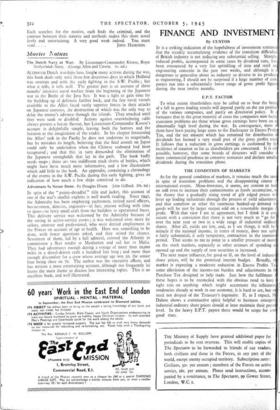FINANCE AND INVESTMENT
By CUSTOS
IT is a striking indication of the hopefulness of investment sentimcn that the steadily accumulating evidence of the transition difficulties of British industry is not inducing any substantial selling. Sharply. reduced profits, accompanied in some cases by dividend -cuts, hat been announced by a very fair sprinkling of iron and steel an engineering concerns in the past two weeks, and although it dangerous to generalise about an industry so diverse in its product as engineering, I should not be surprised if a large number of coin• panies run into a substantially lower range of gross profit figur during the next twelve months.
E.P.T. FACTOR
To what extent shareholders may be called on to bear the brun of a fall in gross trading results will depend partly on the tax position of the various companies, and partly on directorial policy. It fortunate that in the great majority of cases the companies now facia transition problems are those whose gross earnings have been on a abnormally high level during the war. In consequence, most them have been paying large sums to the Exchequer in Excess Profit Tax, and the net amount which has remained for distribution dividends has formed -a vary small part of the gross profits total It follows that a reduction in gross earnings is cushioned by th incidence of taxation so far as shareholders are concerned. It is stil possible, however, that some boards of directors will consider mere commercial prudence to conserve resources and declare smalle dividends during the transition phase.
THE CONDITION OF MARKETS
As for the general condition of markets, it remains much the sam in spite of transition problems and the disappointing course international, events. Most investors, it seems, are content to hol on anti even to increase their commitments as funds accumulate, o the theory that a gradually rising trend of gilt edged prices wi lever up leading industrials through the process of yield adjustmen and that somehow or other the enormous banked-up demand f goods will be met by larger output sold on a reasonable margin o profit. With that view I am in agreement, but I think it is con sistent with a conviction that there is not very much to "go for over the next year or two in a wide range of industrial ordina shares. After all, yields are low, and, as I see things, it will be miracle if the national income, in terms of money, does not suer• a fairly substantial, if only temporary, contraction in the transitio period. That seems to me to point to a smaller pressure of mon on the stock markets, especially as other avenues of spending a opened up and the supply of new securities is increased.
The next major influence, for good or ill, on the level of industry share prices, will be the promised interim budget. Broadly, t market is expecting a moderate reduction in Excess Profits Ta some alleviation of the income-tax burden and adjustments in Purchase Tax designed to help trade. Just how the fulfilment these hopes is to be reconciled with the obvious need to keep tight rein on anything which might accentuate the inflationa tendencies already at work in our economy, it is hard to see, but o need not despair of the Treasury's ingenuity. If, as I expect, A Dalton shows a constructive spirit helpful to business enterpr industrial ordinary share prices should at least maintain their prese level. In the heavy E.P.T. payers there would be scope for som good rises.


























 Previous page
Previous page